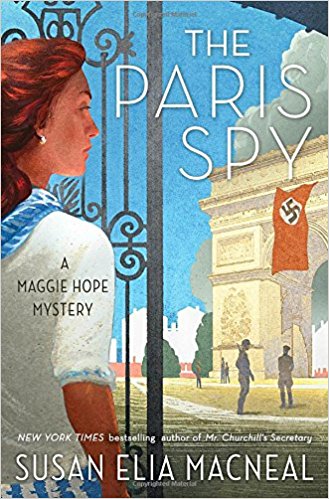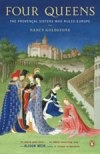 As part of Book Blogger Appreciation Week, today I’m featuring an interview with Ellen of Fat Books & Thin Women. She gets her blog title from a quote from Russell Baker: “Americans like fat books and thin women.” Like her preferred reading material, Ellen has created a pretty fat and in-depth blog, which covers an impressive number of books and short stories. Even more impressive, she manages this while working in the Peace Corps in Macedonia. Ellen will finish up her service there in October and then head to Albania to research Albanian culture as a Fulbright student.
As part of Book Blogger Appreciation Week, today I’m featuring an interview with Ellen of Fat Books & Thin Women. She gets her blog title from a quote from Russell Baker: “Americans like fat books and thin women.” Like her preferred reading material, Ellen has created a pretty fat and in-depth blog, which covers an impressive number of books and short stories. Even more impressive, she manages this while working in the Peace Corps in Macedonia. Ellen will finish up her service there in October and then head to Albania to research Albanian culture as a Fulbright student.
Yesterday, Ellen contributed a guest post to BBAW on Why Book Blogs Mattter, and Why They Should Matter to More People.
1. As someone who identifies Hermione Granger as the character you relate to most, do you see your role as a blogger to try to encourage others to read? If not, what is your primary goal as a book blogger?
I’m not sure I’d say my main goal is to encourage people to read, simply because most of my visitors are already readers. I do like encouraging people to read what I’m reading, though (does that sound bad?). The chance to get other people excited about a book I loved is one of my favorite things about doing the blog, and I see that as one of the most important aspects of the book blogger’s “job.”
2.) I enjoyed perusing your 30-Day Book Meme. Do you have any other read-a-thons or book challenges that you would be eager to participate in?
The 30 Day Meme was great for this August, because it was Ramadan, most of my town was fasting and not available for hanging out during the day; it was a nice chance to reflect on some of my favorite books and characters. I won’t be doing the next Dewey’s Read-a-thon, because it’s just a few days before I finish my Peace Corps service and I’ll be busy packing and saying my goodbyes. It’s something I’d like to do again, though, maybe with some more planning than last time. There are a few people who’ve added a charitable component to their participation in the read-a-thon, which seems like a fantastic (and not too difficult) thing to do, and is something I’d like to do (and maybe encourage others to do) the next time I’m able to join in.
3.) You have a wonderful feature: Story Sundays. I see also that you are a short story writer yourself. Have you found that section as popular as the rest of your blog? What do you see as the role of the short story in today’s literature?
Story Sundays is my favorite section of the blog. For the first few months I wrote it I worried that no one was interested, but kept going because I was. They draw more hits over time – a lot of people arrive at my blog because they’re searching for these stories – than most of my other posts. I find that really encouraging.
Some of the stories are favorites; some are ones I’ve stumbled over. What I’ve done occasionally in the past, what I’d like to do more of in the future, is to highlight stories by lesser known authors. I wish I could better understand why short stories aren’t more popular in the States, especially given the recent popularity of Longreads. You’d think short stories might fall into that same class of “one sitting” reads, but there are so many fantastic stories that aren’t seen by many people. This may be nothing more than personal preference, but I’m bored by so many of the stories in anthologies like Best American (you know, the stories that are actually read by a good number of people) and like to think that if people had easier access to some of the genre-bending stuff put out by smaller presses, they would fall in love with short stories.
4.) How has your work in the Peace Corps informed or influenced your reading? Does it make it easier or harder to read and appreciate escapist books versus non-fiction or literature?
I don’t think being in the Peace Corps has had much of an impact on how I read certain types of books, though it does sometimes give me more of a background to lean on when I’m reviewing a book like Three Cups of Tea (a book that, as a volunteer, I thought gave a pretty inaccurate and at times offensive view of the sort of work people are doing in developing nations). I bought a Kindle before I came over here, so I’ve been able to read a lot of classics and keep up fairly well with new novels. Wonderfully, every Peace Corps office in the world (there’s one in each country, though I believe some countries also have regional “houses” or offices) has a library of books left by previous volunteers. I started reading a lot of authors, like John Grisham, Elizabeth George, and Sue Grafton, that I wouldn’t have touched if their books didn’t dominate the Peace Corps library.
5.) Your Reading List is WOW! How do you pick which of these books to write about and review? Also, I’m curious as to your opinion of the ones that you’ve read but not reviewed. Do you have plans to review them also?
More recent books on the Reading List that I haven’t reviewed, I’m probably getting around to. There are a few books I didn’t review because I didn’t know what I could write about them beyond “amazing, amazing, amazing” (The Handmaid’s Tale, Age of Innocence), but more that I never wrote about because I had to take them back to the Peace Corps office.
7.) Do you read many reviews before choosing to read a book? What do you see as the role and/or duty of book reviews in blogs?
Often if a blogger I trust recommends a book, I read it looking for any more opinions; I like to read by my gut, I guess. I love revisiting reviews after I’ve finished a book and written my own review, to compare thoughts with other bloggers. I don’t see bloggers as a replacement for those newspaper reviews, because the social networking component of blogs is so unique; but I love to see people writing about books they love (or didn’t) in ways that are more representative of the way average readers will respond to a book than the writing of someone for a major book review.
8.) As a writer, have you found that writing a book blog informs or influences your own approach to writing? Do you look at social marketing sites (blogs, twitter, facebook pages) as necessary tools for the contemporary writer?
Writing the book blog hasn’t changed my approach to writing, but it has been interesting in that I’ve now interacted with authors by being one (sort of), editing their work, and being bombarded with review requests. I think all these social marketing sites are necessary tools for today’s writers, but they have to be used carefully; it’s a real turn-off when writers use twitter or their blogs not to interact with a community but to advertise, very bluntly, their works.
9.) Finally: any plans for your blog over the coming months?
Not much; it’ll probably be the same stuff for a while, since I’m moving to Albania in late October. For Story Sundays, I would like to focus more on short stories by lesser known authors in coming months, though. I’d love to do some close reading posts, like the ones The Reading Ape occasionally writes, but it may be a while before I get around to that.
Ellen’s Interview of Sarah from Word Hits
Fat Books & Thin Women
Like Word Hits on Facebook
Follow @WordHits on Twitter

Read Full Post »


















